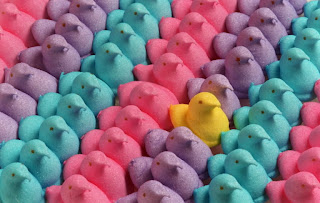Today we have another entry in our expanded section on how to find friends and followers, this one contributed by the delightful Vivian Lee Mahoney. Vivian is a writer, blogger, and a Postergirlz for Reader Girlz.
Vivian and I became acquainted online when she first started stopping by my blog. Earlier this year when I was in Boston, I considered asking Vivian if she wanted to try and meet in person, but I was too shy. However, while I was back east, she and her lovely daughters came to one of my booksignings, wherein she confessed she had considered seeing if I wanted to try and get together, but she was too shy. Is that the quintessential introvert meet up or what??
HOW I FOUND MY VIRTUAL PEEPS by Vivian Mahoney
When Robin asked me to write a few tips on how I found my niche in the virtual world as an introvert, it made me happy. How cool is it that a writer I admire so much, thinks I have a voice in the blogging world?
Then I started to panic. What can I write about that hasn't been covered in all the wonderful Shrinking Violet Promotions posts? I thought about this for some time, and then realized I might as well share the truth with you. I wear a mask.
Not a real one of course. I know, I know. A few of you are probably giggling or rolling your eyes. But, think about it. Isn't it somewhat intimidating that gazillions of people are on the internet and of those numbers, 99.99% of them are strangers? Now add to this equation the strong possibility that people you don't know will visit your blog and/or your website. Maybe it's through a Google search, a recommendation from a friend, or serendipity. In any case, people will find you. What will you do? You can't freak or run away. This is your space, your virtual home--or if you use your writerly imagination--your masquerade ball. It's up to you to create the right atmosphere.
Before I continue, I happen to have a few extra masks. Here you go. Ready? Look at yourself in the mirror. No need to hide your smile. You're absolutely fabulous. Come on now. Let's walk down the steps to the ballroom. I have three secrets to tell you...
1. Use anonymity to your advantage: Except for the .01% of the people out there, no one knows who you really are. You've got a mask on and can be whomever you'd like, as long as you're welcoming and respectful of your guests. Think of the mask as a buffer, something that will give you courage to be yourself in exponential form, without the worry of being found out. Share information, engage in conversation, and have fun! People will be intrigued and come back for more.
2. Be vulnerable: The mask allows you to be vulnerable, without the fear of being discovered. Sometimes it's easier to open up to strangers, and share things—your hobbies, your expertise, your loves, your life—within reason. Maybe the mask makes you feel safe to express yourself—after all, who will read what you have to say? Or maybe you're afraid/embarrassed to share things with the people in your real life, and the mask gives you the courage to let it all out. It's the things we can't always say and finally let out that will make people respond, because they relate to you and see themselves in what you have to say.
3. Be true: People can spot a fake a mile away, even on the internet. Although the mask gives you freedom, remember it will only give you bravery as long as you're true to who you really are. Your virtual peeps stop by to visit because they like you, trust what you have to say, and enjoy the conversation. There's no need to pretend you're something you're not. And you certainly don't need to prove yourself to anyone. You're perfect just the way you are.
It wasn't so hard, was it? Look at all the people having a lovely time at your masquerade ball. You made this happen!
Wear a mask and open up your virtual world. You'll find power you never knew you had. You'll be able to use your anonymity to your advantage, be vulnerable, and true. Your peeps will want to spend more time with you because they connect with you AND they like who they are when they're with you. Soon enough, you'll find you no longer need the mask and even better, you'll find yourself surrounded by a supportive group of virtual peeps. Be brave and let the world see what you have to offer. You can do it.
Thanks so much, Robin, for allowing me to stop by.
Thank YOU, Vivian, for such an honest look at such a terrific management strategy for being online!
=====================================

And the winner of last week's contest is Chris Eboch!
Chris, email me with your address and I will get a copy of the aMaZinG SHIP BREAKER out to you!
More tips on gaining friends and followers next week!







